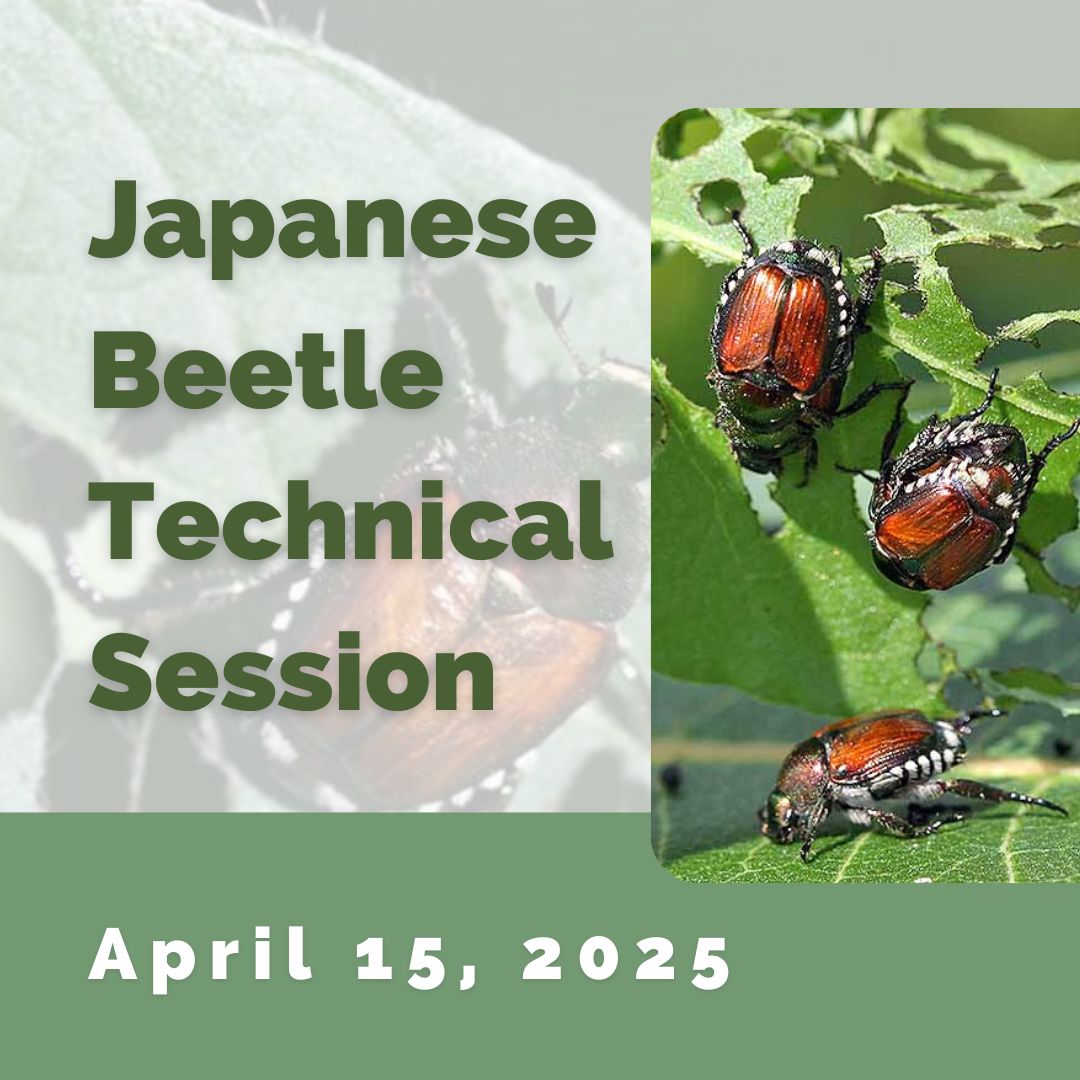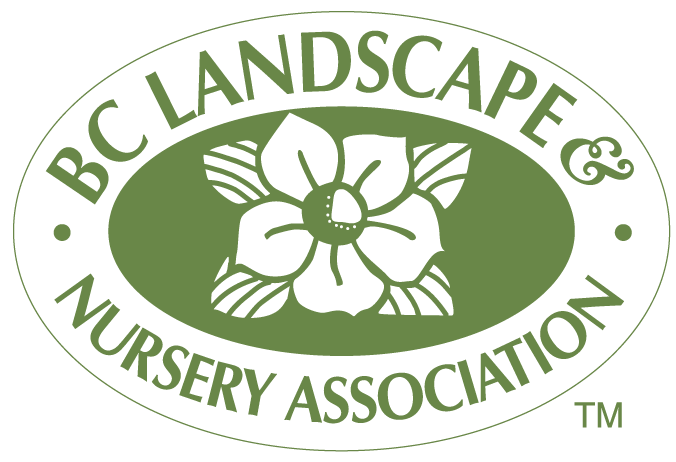Japanese Beetle Information for Landscape Professionals
Japanese Beetle for Landscape Professionals
Japanese beetle is a serious invasive pest threatening turf, ornamentals, and the broader landscape industry in British Columbia. Landscape professionals play a vital role in early detection, prevention, and mitigation efforts. This page provides essential resources, updates, and compliance information to help you stay informed and protect your clients’ green spaces.
Background
Japanese beetle (Popilla japonica) is an invasive pest that feeds on the roots of turf grass and the foliage of more than 300 plant species. This pest could cause serious harm to BC’s agricultural sector and ecosystem, and can significantly damage food crops, lawns, landscapes, golf courses, gardens, and parks. For these reasons, it is a regulated pest under the Plant Protection Act.
Japanese beetle was first detected in the False Creek area of Vancouver in July 2017. Since the initial detection, the BCLNA has participated in a multi-partner eradication response to limit the spread of the pest into other parts of BC, to successfully eradicate its presence, and to maintain BC’s pest-free regulatory status.
The overall number of detections has continued to decrease significantly compared to the 8,276 beetles detected in 2018. However, 2024 distribution trends showed both wins and challenges. The City of Vancouver had zero detections in the 2024 season-a major win for the JB taskforce-along with a decrease within the City of Burnaby. A new satellite population was detected within the City of Kamloops, and the City of Port Coquitlam still saw a significant number of detections.
In the fall of 2024, the Province of BC issued Treatment Orders to the Cities of Burnaby, Port Coquitlam, Vancouver, Abbotsford, and Kamloops for areas surrounding the detections. Dry weather conditions limited the treatment applications to areas with irrigated turf. Untreated areas may result in additional detections being reflected in the detection numbers during 2024 surveillance.

2025 Japanese Beetle Technical Session
Want to dive deeper into the 2025 Japanese Beetle program? Check out our Technical Session page for a recorded webinar, presentation slides, frequently asked questions, and links to a variety of resources.
View Technical SessionRegulated Area
Interactive Map: Type in your postal code or street address to identify whether you are in a Japanese Beetle regulated area.
Based on the number and locations of the detections, the boundaries of the current regulated areas have been reviewed for FY 2024/25, and will include areas within the Cities of Burnaby, Coquitlam, Port Coquitlam and Vancouver, with a new regulated area introduced in Kamloops.
This is in response to an increase in the detections of Japanese beetle found within these areas and was made at the recommendation of the British Columbia Plant Protection Advisory Council (BCPPAC).
CFIA’s Notice to IndustryMovement Restrictions
Until further notice, the CFIA is restricting the movement of plants with soil and soil-related material attached that is infested or likely to be infested with Japanese beetle, in accordance with the Phytosanitary requirements to prevent the spread of Japanese beetle, Popillia japonica, in Canada and the United States (D-96-15).
A CFIA-issued movement certificate is required to move these items out of the regulated areas. This restriction is in effect year-round, and is intended to reduce the risk of unintentional human-assisted spread of the beetle.
Soil and plant parts (including green waste from pruning or grass clippings) will no longer be regulated.
Changes have been put into place to focus efforts on the highest-risk pathway for the beetle to spread, which is plants with soil or compost material attached.
Until further notice, the following restrictions are in effect:
- The movement of plants with soil attached out of a Japanese beetle regulated area is restricted year-round.
A CFIA-issued movement certificate is required to move all the regulated articles listed above outside of a regulated area.
CFIA Guidance for the movement of plants, plant parts and soil leaving a Japanese beetle-regulated area located within British Columbia.
| Regulated Articles | Time of Year | Examples | Movement Certificate Required? |
|---|---|---|---|
| Plants and plant parts with soil attached | Year round | Potted plants, turfgrass, sod, ornamental grasses, raked plant debris with soil | Yes |
| Plants and plant parts with no soil attached (above ground) | June 15 – October 15 | Grass clippings, pruning waste and branches with leaves attached | No |
| Plants and plant parts with no soil attached (above ground) | October 16 – June 14 | Grass clippings, pruning waste and branches with leaves attached | No |
| Soil | Year round | Soil | No |
Apply for a Movement Certificate
If you need to move regulated articles out of a Japanese beetle regulated area, you must apply for a CFIA-issued movement certificate. For questions or to begin your application, contact the CFIA by email at BCPF.Japanese.Beetle@inspection.gc.ca or call 604-292-5742.
Please allow up to one week for a movement certificate to be issued after submitting your completed application form.
How to Apply:
Download and complete the Movement Certificate Application Form (Appendix 2) and submit it to the CFIA at least five business days before your proposed movement date.
Before applying, review the instructions under Appendix 2 of the CFIA Guidance for the movement of plants, plant parts and soil leaving a Japanese beetle regulated area located within British Columbia.
Multi-Use Movement Certificates:
See Section 5.4 of the CFIA’s Guidance document for information on annual multi-use movement certificates. You may be eligible if you live or work in a regulated area, or manage multiple worksites within a regulated area, and need to regularly or frequently transport regulated articles to a location outside of the same regulated area (such as an approved deep burial site, treatment site, transfer station, retail location, or other site).
Please contact the CFIA prior to beginning work, as eligibility for multi-use certificates is assessed on a case-by-case basis. Once issued, you will receive a list of conditions that must be met for all movements. You will also be expected to maintain a movement control log to record the movement of all regulated articles outside of a regulated area.
Best Management Practices
Follow these best practices to prevent the spread of Japanese beetle:
-
Leave it local whenever possible!
- Don’t move soil, plants and green waste outside of the regulated area, unless you have a CFIA-issued Movement Certificate!
- Follow all movement restrictions when working in the regulated area.
- Use local municipal green bins to dispose of plant material that cannot be stored on site.
- Separate plants with soil from plants without it!
-
Tarp your load properly to prevent beetles from flying out!
Watch this video from the Invasive Species Council of BC (ISCBC) for tips. - Thoroughly clean gardening and lawn care equipment regularly – Clean soil from all equipment and tools, including lawn mowers, aerating and power raking equipment, especially if you intend to use these items at another location or job site.
- Check your clothing, equipment and vehicles for hitchhiker beetles! Japanese beetles can even hitch a ride on your work boots!
-
Know before you go!
- Understand the legal requirements and get a CFIA-issued movement certificate in advance!
- Take the most direct route to the nearest approved transfer station.
- Keep a map of the regulated area in all crew trucks for easy reference.
- Ensure your stops are within transfer station hours.
- Consolidate loads when inside the regulated area to reduce the number of trips required.
- Some fees may apply. Have an accepted payment method ready.
Disposal Options
A CFIA-issued movement certificate is legally required to move all regulated articles outside of a regulated area. This includes movement to a transfer station or disposal site located outside of a regulated area.
Recommended: Use on-site municipal green waste bins whenever possible. This is the safest way to manage plant waste and minimize the risk of spreading Japanese beetle.
Sat – Sun 8:00 am – 6:00 pm
Standard tipping fees apply.
- * The Burnaby Eco-Centre will only accept green waste from the Burnaby regulated area.
- ** The North Shore Transfer Station does not accept green waste from any Japanese beetle regulated area.
Treatment
Treatment for Japanese beetle is coordinated by the Ministry of Agriculture and Food (MAF). The 2025 treatment response will consist of a single larvicide treatment (Acelepryn) of turfgrass on public and private lands.
The cities will coordinate treatment of public lands (city parks, boulevards, etc.) and treatment of private lands is on a voluntary basis and completed by licensed applicators through the MAF.
Costs of this treatment within the Treatment Area are covered by the Province and the project partners. If you have clients residing in the Treatment Area who require treatment of their private land that you will perform for them, please contact the BCLNA.
Non-Compliance
One of the enforcement options is to issue an Administrative Monetary Penalty (AMP), which is a Notice of Violation with either a warning or a penalty. Penalties for individuals can range from $500 to $1,300, and from $1,300 to $10,000 for violations committed during the course of business.


